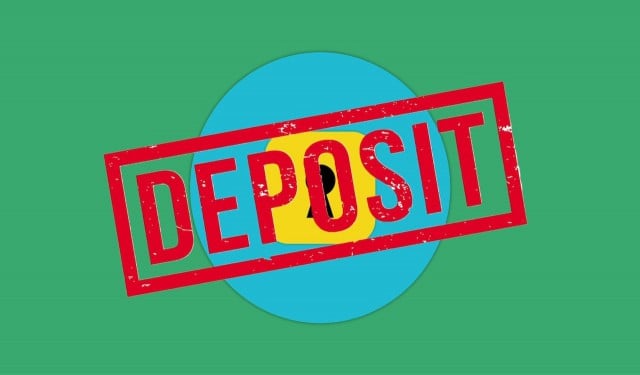A deposit is the sum of money you pay to a bank or other financial institution to be held on your behalf in an account. People and organizations daily deposit money into their accounts by transferring their finances, typically in the form of cash or checks. Depositors may receive interest on their funds depending on the type of account. You can make one-time or recurring deposits.
The term "deposit" can also describe cash you pay in advance to guarantee to receive a service or product. For instance, a renter might be required to give their landlords a security deposit before moving in.
How Does a Deposit Work

A deposit can indicate one of two effects. An example of a deposit is when you give money to someone else to keep secure. Hence, a deposit is money that an investor deposits into a savings or checking account with a credit union or bank.
In such case, the deposit amount remains the possession of the individual or companies that made deposit, who can withdraw the money whenever they need, use the funds to make purchases, or transfer the money to another person's account.
A minimum deposit or an opening deposit is usually required to open a new bank account. While a transaction deposit is made when you deposit the money in a regular checking bank account, which means there are no interruptions, and the money is directly liquid and available.
Using a portion of the cash as collateral or security for product delivery is the alternative definition of a deposit. As a gesture of good faith, some contracts demand a portion of the money to be paid before delivery. For example, brokerage companies frequently demand that traders deposit initial margin money before committing to a new legal futures contract.
Types of Deposits

When you make a deposit into your account, the money is yours. Depending on the type of deposit you make, there can be restrictions on how much you can withdraw and move.
There are two fundamental types of deposits:
Demand Deposits
Demand deposits let you withdraw money on demand. The most frequent connection between demand deposit accounts and checking accounts is that both require up to six days' notice before withdrawal. Because of their flexibility, these accounts often pay little to no interest.
Time Deposits
Time deposits prevent you from moving your funds until you have paid an early withdrawal fee. A credit union or bank will give you a greater interest rate in return for the period on those funds. A certificate of deposit (CD) is a typical time deposit account.
What is a Direct Deposit
A direct deposit is an online or e-transfer of money from one bank account to another, whether it belongs to a person or an organization. You must give the other party your bank account information and routing number in order to complete the automatic payment process.
The convenience that direct deposits provide is one-factor influencing people's decisions. For example, many companies give their workers the option of receiving their salary by direct deposit. The money will be electronically placed into your bank account instead of being given to you in cash or a check. Some accounts allow you to see your paycheck at least two days ahead of time with early direct deposit.
Or, if the internal revenue system (IRS) sends you a tax refund, you can have it deposited directly into your bank account. You might have access to the money within days rather than waiting for a check to arrive in the e-mail.
Types of Deposit Accounts
Deposit accounts come in various forms, each serving a unique function. Some accounts are intended for long-term savings, while some are more suited for daily use. The various kinds of deposit accounts are as follows:
- Checking account: As the name suggests, a checking account enables you to use a debit card or to write checks. It is employed to pay bills and daily expenses. It normally pays no interest or very little interest.
- Savings accounts: They are designed to put money away for future needs or specified objectives. Savings accounts often offer minimal interest.
- Call deposit accounts: A call deposit account combines the benefits of checking and savings accounts. You can quickly write checks, retrieve the money, and collect interest on your deposits.
How do you make a Deposit?
Customers can deposit money in a variety of methods depending on the financial institution or bank, including:
In-person: Clients can go to a bank location and deposit money into their accounts using cash or checks.
Through an ATM: Customers may use an ATM to deposit money into some accounts.
Mail: A few banks may accept paper checks sent by postal mail. They transfer the check's proceeds into the client's account.
Online: Customers can make online deposits of money. E-payments and direct deposits are included in this. When clients use direct deposits, for instance, their employer delivers paychecks straight to the bank. The bank transfers the employer's electronic funds and deposits them in the client's account.
You can deposit cash and checks at one of a traditional financial institution's physical locations or ATMs if your account is with them. Through their apps, several institutions offer support for mobile check deposits.
However, making a cash deposit at an online bank is more complicated. It necessitates finding innovative solutions, such as making a deposit into an account at a conventional institution and then transferring the money.